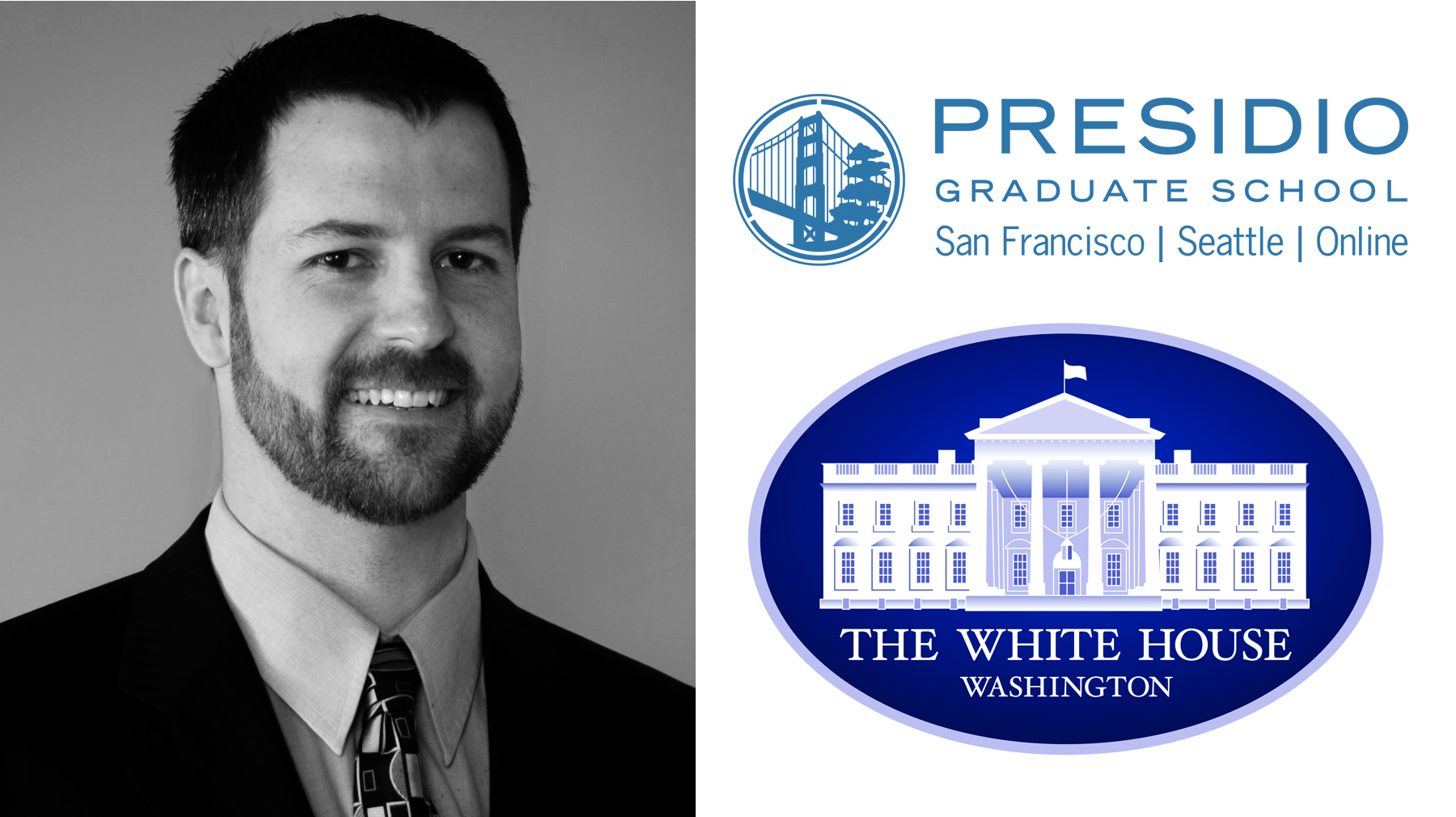A Presidian in the White House
By Tanya Weliky
When asked about the process of landing the position of Senior Policy Advisor in the White House, David Groves (C13) chuckled,
“I would never have predicted there’d be a direct line from one of my Presidio Graduate School projects to having to pass through a Secret Service checkpoint on the way to my office every morning.”
Video interview conducted by TriplePundit, a Certified B-Corporation, is a global media platform covering the intersection of people, planet, and profit.
With a career spent working in nonprofits, David realized he couldn’t authoritatively speak the language of business. An MBA, he reasoned, would complement his skill set. But a conventional program just wouldn’t work for him. “Presidio was the perfect balance of learning the technical aspects of things like finance and accounting while also getting to question the underlying assumptions of neoclassical economics or learning why traditional financial analysis oftentimes leads to decisions with unsustainable outcomes.”
The seeds to the White House position were first planted in David’s fourth semester Capital Markets course. Professors Scott Fullwiler and Vanessa Fry did a lesson on an innovative financing structure called a Social Impact Bond where private capital had been used in the U.K. to finance a program to improve outcomes for repeat offenders. Fellow C13er, Eric Cetnarski, said to David, “I bet this Social Impact Bond idea could be used in an environmental context.” They decided to make this their semester-long team project.
David, Eric, and teammate, Jared Brick, sat down with Scott and Vanessa to brainstorm. Scott suggested using the structure to finance wildfire prevention projects and the team ran with it. At the end of the semester, the team presented their findings and the first question was: ‘This seems like a solid idea… Are planning to pursue it after Presidio?’ It wasn’t until then that David thought the project was anything more than an academic exercise.
After graduation, David started pitching the idea around town. The general response was,
“If you can find your own funding, we’ll hire you to do it.” David thought, “If I can find the funding, I’ll hire myself.”
Little did he realize how naive this notion was, given the difficulty of raising philanthropic capital as a new nonprofit with no track record. Over the next year, David worked as a consultant to pay the bills but spent as much time as he could reading academic journals on forest and fire ecology and talking to academics, investors, foresters, and government staffers. Eventually, he developed a feasibility analysis and financial model showing how the concept could work.
In the fall of 2013, the U.S. Treasury Department released a Request for Information (RFI) to collect ideas on how to spend down a $300 million “Pay for Success Incentive Fund” the Obama administration was including in its FY15 budget. David reworked the feasibility study into a response to the RFI and submitted.
“I assumed my paper would disappear into the ether of the federal bureaucracy, but after only a week, I got an email from a Senior Policy Advisor at the White House asking if we could talk.’”
Of the 25 responses to the RFI, David’s stood out as the only one focused on a natural resources-based intervention. After a long conversation, David Wilkinson, the Senior Policy Advisor, connected David with senior staff at several federal agencies, helping to legitimize the effort. David Wilkinson would call periodically to check in on the project and see how he could help.
About a year into these conversations, David Wilkinson called to tell David that he had just been promoted to director of the White House Office of Social Innovation and was looking to back-fill his old position. He asked if David was interested in joining the team. The decision was not as easy as one might think, as David had finally secured full funding to develop his project the previous month. After a brief contemplation, he realized a position at the White House is not something to pass up.
As David recalled his story, he knew that his MBA had helped him stand out from the crowd in Washington, DC.
“Having a sustainable MBA is a real advantage in this town, where everyone is a lawyer or has a political science degree.”
It’s been said you can accomplish more in a week working in the White House than a year at many other jobs. Evidence for the intensity of the work was demonstrated by the fact that most of this interview occurred as David was picking up his dinner around 9:00 PM before heading back to his office for a couple more hours of work.
Despite the year away from home, the many long nights at the office, and the results in November, David doesn’t regret a thing.
“There’s no way I was handing out my last business card, with my name and title just below the embossed seal of the President of the United States.”
It’s a reminder of a most incredible experience and the unusual journey he took to get there.
-David Wilkinson was Director of the White House Office of Social Innovation and David Groves was Senior Policy Advisor in the White House Office of Social Innovation.

